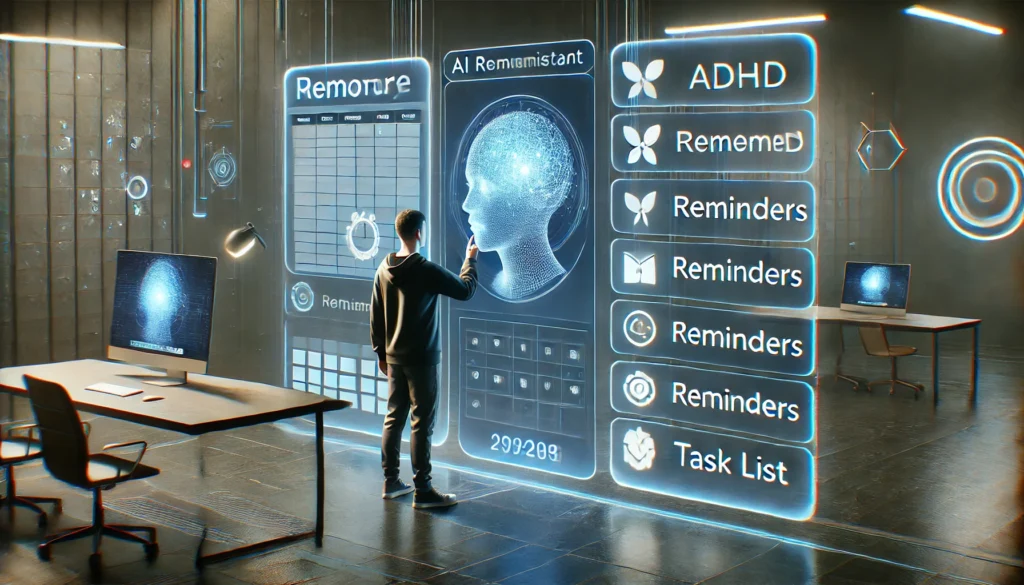In the realm of cognitive health, few topics spark as much interest and discussion as Attention Deficit Hyperactivity Disorder (ADHD) and its impact on memory and recall. As a condition that affects millions worldwide, understanding ADHD’s intricate relationship with memory processes is crucial. This understanding is vital not only for individuals with ADHD but also for those who support them, such as health and wellness coaches, science journalists, and biohackers. By delving into how ADHD affects memory, we can uncover strategies to manage its challenges and improve quality of life.
You may also like: Enhancing Concentration: Strategies for ADHD
Understanding ADHD and Its Cognitive Dynamics
ADHD is a neurodevelopmental disorder characterized by symptoms such as inattentiveness, hyperactivity, and impulsiveness. While these symptoms are widely recognized, the nuanced ways in which ADHD influences cognitive functions, particularly memory and recall, are often less understood. In exploring the question, “Is forgetfulness a sign of ADHD?” we delve into the cognitive intricacies that define the disorder.
ADHD: Beyond the Behavioral Symptoms
ADHD is commonly associated with behavioral symptoms such as restlessness and impulsivity. However, these outward signs are just the tip of the iceberg. Beneath them lie complex cognitive dynamics that significantly impact memory and recall. This section explores how ADHD extends beyond behavior to affect cognitive processes.
Cognitive Intricacies of ADHD
To truly grasp the cognitive intricacies of ADHD, it’s essential to understand how it alters brain function. ADHD affects neural pathways and brain regions responsible for attention and memory, leading to distinctive cognitive patterns. This section breaks down the science behind these changes, offering insights into how ADHD alters cognitive function.
Memory Processes and ADHD
Memory processes are particularly vulnerable in individuals with ADHD, leading to forgetfulness and absent-mindedness. These challenges stem from ADHD’s impact on memory encoding, storage, and retrieval. By examining these processes, we can better understand how ADHD disrupts memory and explore potential interventions.

Forgetfulness and ADHD: The Underlying Mechanisms
Forgetfulness and absent-mindedness are often reported by individuals with ADHD, leading many to question, “Is forgetfulness a symptom of ADHD?” Indeed, these memory lapses can be attributed to several cognitive factors associated with the disorder.
Exploring Forgetfulness in ADHD
Forgetfulness in ADHD isn’t simply a matter of not paying attention. It involves complex cognitive mechanisms that hinder information processing. This section delves into how ADHD leads to forgetfulness, examining the disorder’s impact on short-term and long-term memory.
The Connection Between ADHD and Absent-Mindedness
Absent-mindedness is a hallmark of ADHD, but it’s more than just a quirky trait. It reflects a deeper cognitive struggle with maintaining focus and organizing thoughts. Here, we explore why absent-mindedness is prevalent in ADHD and how it affects daily functioning.
Cognitive Factors Contributing to Forgetfulness
ADHD-related forgetfulness is driven by a combination of cognitive factors, including impaired executive function and working memory. This section examines these factors in detail, highlighting their role in memory lapses and exploring ways to mitigate their effects.
The Role of Executive Functioning Deficits
At the heart of ADHD-related forgetfulness lies a deficit in executive functioning. Executive functions are cognitive processes that manage and regulate other cognitive abilities, including working memory, cognitive flexibility, and inhibitory control. In individuals with ADHD, these functions often operate at a diminished capacity, resulting in challenges with task management and memory retention.
Understanding Executive Functions
Executive functions are the brain’s command center, orchestrating complex tasks and regulating behavior. ADHD disrupts these functions, leading to difficulties in organizing tasks and maintaining focus. This subsection explores the components of executive function and how they are affected by ADHD.
Executive Dysfunction and Memory
Executive dysfunction in ADHD is closely linked to memory challenges. When executive functions are impaired, individuals struggle with planning, prioritizing, and recalling information. Here, we delve into the relationship between executive dysfunction and memory, offering insights into how it contributes to forgetfulness.
Strategies to Enhance Executive Function
Improving executive function can significantly alleviate memory issues in ADHD. This subsection offers practical strategies to enhance executive function, including organizational techniques, cognitive exercises, and lifestyle changes.
Working Memory Challenges
Working memory, a core component of executive functioning, is frequently impaired in those with ADHD. This form of memory allows individuals to hold and manipulate information temporarily. When working memory is compromised, as is common in ADHD, there is a marked increase in forgetfulness and difficulties with recall.
The Importance of Working Memory
Working memory is essential for everyday tasks, from following instructions to solving problems. ADHD disrupts working memory, leading to challenges in processing and recalling information. Here, we discuss the significance of working memory and how its impairment affects daily life.
ADHD and Working Memory Deficits
ADHD often results in working memory deficits, making it difficult to retain information temporarily. This subsection explores the nature of these deficits and their impact on cognitive performance, offering insights into why individuals with ADHD struggle with memory tasks.
Enhancing Working Memory in ADHD
Improving working memory can greatly benefit individuals with ADHD. This subsection provides strategies to enhance working memory, including cognitive training, memory aids, and targeted exercises designed to boost memory capacity.
Absent-Mindedness in ADHD
Absent-mindedness, often synonymous with ADHD, is not merely a personality trait but a manifestation of the disorder’s cognitive impacts. The term “absent-minded ADHD” reflects the frequent distractions and lapses in attention that characterize the condition.
The Nature of Absent-Mindedness
Absent-mindedness in ADHD is characterized by frequent distractions and lapses in attention. This subsection explores the nature of absent-mindedness, examining how it manifests in individuals with ADHD and its impact on daily life.
Cognitive Impact of Absent-Mindedness
Absent-mindedness can have significant cognitive consequences, affecting focus, attention, and memory. Here, we delve into the cognitive impact of absent-mindedness, highlighting its role in memory challenges and exploring potential strategies for improvement.
Managing Absent-Mindedness in ADHD
While absent-mindedness is a common feature of ADHD, it can be managed with effective strategies. This subsection offers practical tips for reducing absent-mindedness, including mindfulness practices, organizational techniques, and cognitive exercises.
The Role of Attention Dysregulation
Attention dysregulation is a key feature of ADHD, leading to difficulties in maintaining focus on tasks. This dysregulation contributes to the absent-minded behaviors observed in ADHD, where individuals might struggle to stay engaged with a task, leading to forgotten details and unfinished activities.
Understanding Attention Dysregulation
Attention dysregulation in ADHD involves difficulties in maintaining focus, resulting in frequent distractions. This subsection explores the nature of attention dysregulation and its impact on cognitive performance, offering insights into how it contributes to memory challenges.
The Impact of Attention Dysregulation on Memory
Attention dysregulation can significantly affect memory processes, leading to forgetfulness and information retention difficulties. Here, we examine the impact of attention dysregulation on memory, highlighting its role in ADHD-related cognitive challenges.
Strategies to Improve Attention Regulation
Improving attention regulation can alleviate memory issues in ADHD. This subsection provides practical strategies to enhance attention regulation, including mindfulness practices, cognitive exercises, and lifestyle changes.
Sensory Overload and Memory Disruption
Individuals with ADHD often experience sensory overload, which can further disrupt memory processes. The bombardment of stimuli can overwhelm cognitive resources, causing memory lapses and absent-mindedness as the brain struggles to prioritize and encode information effectively.
Understanding Sensory Overload in ADHD
Sensory overload occurs when individuals are overwhelmed by excessive stimuli, making it difficult to process information. This subsection explores the nature of sensory overload in ADHD and its impact on cognitive function, offering insights into how it disrupts memory processes.
The Cognitive Impact of Sensory Overload
Sensory overload can have a significant impact on cognitive performance, affecting attention, memory, and information processing. Here, we delve into the cognitive consequences of sensory overload, highlighting its role in ADHD-related memory challenges.
Managing Sensory Overload in ADHD
While sensory overload is common in ADHD, it can be managed with effective strategies. This subsection provides practical tips for reducing sensory overload, including environmental modifications, sensory regulation techniques, and mindfulness practices.

Historical Perspectives and Current Trends
To fully appreciate how ADHD affects memory and recall, it’s essential to consider both historical perspectives and current trends in the field.
Historical Context of ADHD and Memory Research
Historically, research on ADHD has focused predominantly on behavioral symptoms, with less emphasis on cognitive aspects such as memory. Early studies often overlooked the nuanced ways in which ADHD affects cognitive functions, leading to a gap in understanding that is only now being addressed through more comprehensive research.
Early Approaches to ADHD Research
In the early days of ADHD research, the focus was primarily on behavioral symptoms rather than cognitive processes. This subsection explores the historical context of ADHD research, highlighting the initial focus on behavior and the subsequent shift towards cognitive understanding.
The Evolution of ADHD and Memory Studies
Over time, researchers began to recognize the importance of studying cognitive aspects of ADHD, including memory. This subsection examines the evolution of ADHD research, highlighting key milestones and shifts in focus that have enhanced our understanding of the disorder.
Bridging the Gap: Cognitive and Behavioral Research
Modern research seeks to bridge the gap between cognitive and behavioral studies of ADHD. Here, we explore how integrating cognitive insights with behavioral research can provide a more comprehensive understanding of ADHD and its impact on memory.
Recent Advances and Future Directions
Recent advancements in neuroimaging and cognitive psychology have shed light on the complex interplay between ADHD and memory. Studies utilizing functional MRI (fMRI) have revealed atypical neural activity patterns in regions of the brain associated with memory and executive function in individuals with ADHD.
Neuroimaging Insights into ADHD
Neuroimaging techniques, such as functional MRI (fMRI), have provided valuable insights into the neural mechanisms underlying ADHD. This subsection explores how neuroimaging has advanced our understanding of ADHD’s impact on memory and cognitive function.
Cognitive Psychology and ADHD
Cognitive psychology has played a crucial role in exploring the intricate relationship between ADHD and memory. Here, we delve into recent advances in cognitive psychology research and their implications for understanding ADHD-related memory challenges.
Future Directions in ADHD Research
As research continues to evolve, new directions are emerging in the study of ADHD and memory. This subsection explores potential future avenues for research, including the exploration of nootropics, cognitive training interventions, and personalized treatment approaches.
The Potential of Nootropics and Cognitive Training
Looking forward, future research aims to explore the potential of nootropics and cognitive training interventions to mitigate memory deficits in ADHD. These cutting-edge approaches hold promise for enhancing cognitive performance and reducing the impact of ADHD on memory and recall.
Understanding Nootropics and Their Potential
Nootropics, often referred to as “smart drugs,” are substances that may enhance cognitive function. This subsection explores the potential of nootropics in improving memory and cognitive performance in individuals with ADHD.
Cognitive Training Interventions for ADHD
Cognitive training interventions aim to improve cognitive function through targeted exercises and activities. Here, we examine the potential of cognitive training interventions to enhance memory and attention in individuals with ADHD.
Integrating Nootropics and Cognitive Training
Combining nootropics with cognitive training may offer a synergistic approach to improving cognitive performance in ADHD. This subsection explores the potential benefits of integrating these approaches and highlights ongoing research efforts in this area.

Practical Implications and Strategies
For those living with ADHD or supporting someone with the disorder, practical strategies can help manage memory-related challenges.
Cognitive Behavioral Strategies
Cognitive-behavioral strategies, including organization techniques and memory aids, can be effective in managing ADHD-related forgetfulness. Utilizing tools such as planners, alarms, and digital reminders can help individuals stay organized and reduce the burden on working memory.
Organizational Techniques for ADHD
Organizational techniques can significantly improve memory and task management in individuals with ADHD. This subsection provides practical tips for implementing effective organizational strategies, including the use of planners, checklists, and digital tools.
Memory Aids and Tools
Memory aids, such as alarms and reminders, can help individuals with ADHD manage forgetfulness and improve recall. Here, we explore various memory aids and tools that can support cognitive function and enhance memory retention.
Cognitive-Behavioral Therapy for ADHD
Cognitive-behavioral therapy (CBT) can offer valuable support for individuals with ADHD, helping them develop effective coping strategies. This subsection examines the role of CBT in managing ADHD-related memory challenges and improving overall cognitive function.
Mindfulness and Focus Enhancement
Mindfulness practices can improve attention regulation and reduce absent-mindedness. Techniques such as meditation and deep breathing exercises can enhance focus, allowing individuals with ADHD to better manage distractions and improve their memory retention.
The Benefits of Mindfulness for ADHD
Mindfulness practices can help individuals with ADHD enhance focus and attention regulation. This subsection explores the benefits of mindfulness for ADHD, highlighting its role in reducing absent-mindedness and improving cognitive performance.
Mindfulness Techniques for Focus Enhancement
Various mindfulness techniques, such as meditation and deep breathing exercises, can enhance focus and attention in individuals with ADHD. Here, we provide practical guidance on implementing mindfulness practices to improve cognitive function.
Integrating Mindfulness into Daily Life
Integrating mindfulness into daily routines can offer lasting benefits for individuals with ADHD. This subsection explores ways to incorporate mindfulness practices into everyday life, enhancing cognitive performance and reducing memory challenges.
Biohacking and Nootropic Interventions
For biohackers seeking to optimize cognitive function, exploring nootropic supplements and lifestyle modifications can be beneficial. Ingredients such as omega-3 fatty acids, ginkgo biloba, and Bacopa monnieri are often cited for their potential to support brain health and memory.
Exploring Nootropic Supplements
Nootropic supplements are gaining popularity for their potential to enhance cognitive performance. This subsection examines popular nootropic ingredients and their potential benefits for individuals with ADHD.
Lifestyle Modifications for Cognitive Enhancement
Lifestyle modifications, such as diet and exercise, can play a crucial role in optimizing cognitive function in ADHD. Here, we explore practical lifestyle changes that can support brain health and improve memory.
The Role of Biohacking in ADHD Management
Biohacking involves using technology and self-experimentation to optimize health and performance. This subsection explores how biohacking principles can be applied to manage ADHD-related memory challenges and enhance cognitive function.
Conclusion
In conclusion, the relationship between ADHD and memory is multifaceted, encompassing deficits in executive function, working memory, and attention regulation. As research continues to evolve, our understanding of these cognitive dynamics deepens, providing new insights and strategies for managing memory challenges in ADHD.
For health and wellness coaches, science journalists, and biohackers, staying informed about the latest developments in ADHD research is essential. By leveraging current knowledge and practical strategies, we can better support individuals with ADHD in navigating the complexities of memory and recall.
Through a balanced approach that combines scientific insights with practical advice, we empower those with ADHD to overcome memory-related challenges and lead fulfilling lives. By embracing these strategies, individuals with ADHD can enhance their cognitive function, improve memory retention, and achieve their full potential.
Further Reading:
ADHD and memory loss: Is it executive dysfunction or something else?
9 Tips to Recall Forgetfulness in ADHD
Is Memory Loss ADHD, or Something Else?
Important Note: The information contained in this article is for general informational purposes only, and should not be construed as health or medical advice, nor is it intended to diagnose, prevent, treat, or cure any disease or health condition. Before embarking on any diet, fitness regimen, or program of nutritional supplementation, it is advisable to consult your healthcare professional in order to determine its safety and probable efficacy in terms of your individual state of health.
Regarding Nutritional Supplements Or Other Non-Prescription Health Products: If any nutritional supplements or other non-prescription health products are mentioned in the foregoing article, any claims or statements made about them have not been evaluated by the U.S. Food and Drug Administration, and such nutritional supplements or other health products are not intended to diagnose, treat, cure, or prevent any disease.


